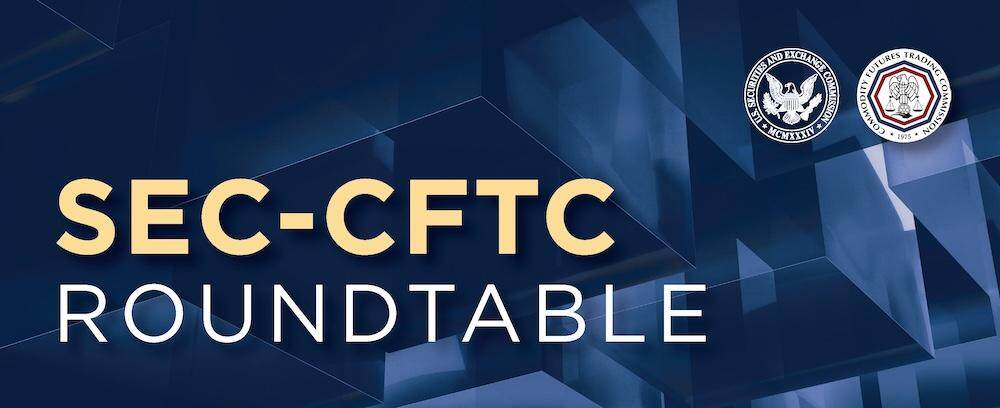The US SEC and CFTC have teamed up for the first time, ushering in a new trend in US crypto regulation.
ヴェンザー ( @ウェンサー 2010 )
On September 5, the U.S. Securities and 交換 Commission (SEC) and the Commodity Futures Trading Commission (CFTC) jointly issued two statements.
One document stated that the two sides would strengthen collaboration to support the development of 暗号 assets, DeFi, prediction markets, perpetual contracts, and portfolio margin; and would subsequently enhance the competitiveness of the US market through regulatory coordination, narrowing regulatory gaps, extending trading hours, and utilizing innovative exemptions. The other document announced that the two sides would hold a joint roundtable meeting on September 29th, with planned discussions including “considering harmonizing product and venue デフィnitions, simplifying reporting and data standards, adjusting capital and profit frameworks, and leveraging each agency’s existing exemption powers to establish coordinated innovation exemptions.”
As two crucial regulatory agencies in the U.S. economic system, the actions of the U.S. SEC and CFTC may indicate that new actions are about to be taken in U.S. crypto regulation. Odaily Planet Daily will briefly analyze this incident and its related impact in this article.
The core goal of the joint US SEC and CFTC regulation is to make American Capital Great Again.
In two joint statements issued by the US SEC and CFTC, both mentioned “ensuring the United States’ leading position in global capital markets,” demonstrating that the core objective of this joint regulation remains part of the Trump administration’s “America First” policy. Specifically, the primary impact of this joint regulation is reflected in the following areas:
1. Open the U.S. market to crypto trading platforms.
According to previous information and a joint statement from the two agencies, the US CFTC plans to issue guidance clarifying registration rules for foreign trading platforms. The prediction market Polymarket has received CFTC approval to re-enter the US market . The SEC and CFTC will also explore the introduction of perpetual swaps in the US market, enabling traders to participate in related products previously primarily available overseas on local platforms. Furthermore, the two agencies plan to explore areas such as 24/7 markets, prediction markets, portfolio margin optimization, and DeFi innovation exemptions.
There is no doubt that after Trump came to power, the US government reversed its previous “closed-door” attitude towards the cryptocurrency industry and planned to fully open the US market to attract a number of crypto trading platforms to participate in the construction of the US crypto economic system.
2. Further attract overseas capital liquidity.
The U.S. CFTC plans to clarify the registration rules for foreign trading platforms (FBOTs). This will not only attract industry infrastructure such as trading platforms to the U.S. market, but will also allow large-scale inflows of funds, capital, and liquidity from U.S. and global crypto users. U.S. crypto market participants including Gemini, Kraken, and Coinbase will also be able to reach more users and liquidity worldwide.
As Caroline D. Pham, Acting Chair of the U.S. CFTC, previously stated: “This is a way to ‘repatriate’ crypto activity, which had previously been diverted abroad due to Biden-era law enforcement, while reaffirming the regulatory framework that has existed since the 1990s. For U.S. traders, this means legal access to more global liquidity; for the crypto industry, it is another step towards regulatory clarity and an initiative of the Trump administration’s ‘Crypto Sprint Strategy.'”
3. Reduce regulatory costs and improve law enforcement efficiency.
Under existing US law, the SEC and CFTC are both financial regulatory agencies, but their powers differ: the SEC was established and enforces law primarily under the Securities Act of 1933 and the Securities Exchange Act of 1934, while the CFTC exists and regulates under the Commodity Exchange Act (CEA). In other words, the SEC primarily regulates the securities market, emphasizing investor protection and disclosure requirements, with penalties including civil fines, injunctions, and criminal referrals; the CFTC, on the other hand, focuses on commodity futures and derivatives markets, emphasizing risk management and anti-manipulation, often involving leveraged trading and high-risk derivatives. Joint oversight will further clarify the boundaries of authority between the two agencies, while reducing regulatory costs and improving enforcement efficiency, effectively rendering “give to God what is God’s, and to Caesar what is Caesar’s.”
4. Encourage innovation while strengthening risk control.
The introduction of several potential policies and favorable measures will further encourage innovative development among US crypto companies. In particular, the introduction of innovative exemptions for 24/7 trading, portfolio margin, and DeFi are expected to inject new momentum into the development of DeFi within the US financial sector. Furthermore, the two departments emphasized “compliance with investor and customer protection standards,” and subsequent policies may be introduced to further strengthen risk management and reduce market manipulation. In the long term, this move may effectively reduce the disorderly price manipulation and speculation currently plaguing the crypto market.

After crypto IPOs, crypto derivatives may become a new highland in the United States
Following the completion of benchmark IPO events in the crypto industry such as the “crypto asset management giant” Galaxy, the “first stablecoin stock” Circle, and the crypto trading platform Bullish, with the joint regulatory statement issued by the US SEC and CFTC, crypto derivatives and DeFi may become the next US crypto innovation highland.
In the past, due to the high-pressure regulatory situation in the United States, many cryptocurrency exchanges and projects avoided the US user market. The joint statement of the US SEC and CFTC is equivalent to sending a signal of a new round of regulatory direction: encouraging rapid development and prospering the US crypto financial market, and launching more innovative products that meet exemption requirements based on risk control and investor protection.
On the one hand, “US-based crypto projects” such as WLFI, Uniswap, Solana, and Moonpay may usher in a new round of expansion and favorable regulatory policies;
On the other hand, cryptocurrency index funds and related targets such as Coinbase, Gemini, Kraken, Kalshi, Polymarket, Bitcoin Spot ETF, Ethereum Spot ETF, etc. will usher in more active traders and a new wave of liquidity.
It is worth mentioning that this joint supervision may open up imagination space for the U.S. financial market to activate the liquidity of traditional financial markets with the help of the crypto economic system. Traditional fund institutions including traditional index funds, state pension funds, university endowment funds, etc. are expected to use this to make more crypto asset allocations.
Combined with Nasdaq’s previous announcement that it would tighten regulatory measures on listed companies establishing cryptocurrency reserves, it is becoming increasingly difficult to achieve the effect of “double-flying of cryptocurrency and stock” by simply relying on a “coin hoarding strategy” through a backdoor listing. Instead, one can only hope for the innovation of more standardized and innovative crypto-financial products and the introduction of liquidity.
In addition, although Strategy, the “first BTC hoarding stock”, met all the hard conditions for the S&P 500 components but was not selected for the S&P 500, CFTC Acting Chairman Caroline Pham previously described this as the “Uberization of Bitcoin”, that is, digital assets are integrated into the US economic system to the point where they are difficult to eliminate, which shows the importance the US CFTC attaches to crypto concept stocks.
Unlike the Internet economy that has penetrated into every aspect of people’s lives, the cryptocurrency industry currently only stays in the field of financial investment. However, with the development of different tracks such as PayFi, DeFi, prediction markets, and US stock tokenization markets, the crypto economy will also further realize the mainstream process based on ETF funds.
Also attached are the relevant time points for US CFTC regulatory measures:
On August 21, Acting CFTC Chairwoman Caroline D. Pham 発表された the launch of the next phase of the CFTC’s Crypto Sprint initiative to implement the recommendations of the President’s Digital Asset 市場s Task Force report. The initiative focuses on promoting digital asset spot trading at the federal level and aligns with the SEC’s “Crypto Project,” echoing President Trump’s call for U.S. leadership in the crypto space.
On September 5, the U.S. CFTC and SEC jointly issued a statement , intending to promote joint supervision of cryptocurrencies and derivatives.
On September 29th, a joint CFTC-SEC roundtable will be held at the SEC’s headquarters at 100 NE F Street in Washington, D.C. The roundtable will be open to the public and will be webcast live on the SEC website. A recording of the roundtable will be posted on the SEC’s website. Details of the agenda and participants can be found ここ .
によると previous remarks by Caroline D. Pham, Acting Chairperson of the U.S. CFTC, the CFTC will widely solicit opinions from stakeholders, covering topics such as leverage, margin, and retail financing transactions, and will open a channel for public submission of opinions before October 20.
この記事はインターネットから得たものです。 The US SEC and CFTC have teamed up for the first time, ushering in a new trend in US crypto regulation.Recommended Articles
Related: Crypto narrative in the post-retail era: When the bull market is no longer noisy
Original author: Ada, TechFlow The bull market is here, but why are all the groups so quiet? Netizen Macaroni raised this question in the Opensky community group. “Because of short position + short order.” Group member Niner replied. For Niner, who had experienced the last round of bull and bear markets, this bull market should have been a good time to make a fortune, but Niner admitted that he didnt make any money in this market. Similar to Niner is Johhny, a full-time trader who said he has never made any money since Trump launched the Trump. There are many cases like Niner and Johhny. Wagmi Capital partner Mark said in an interview that in this bull market, 90% of retail investors do not make money. Although Niner has not…






